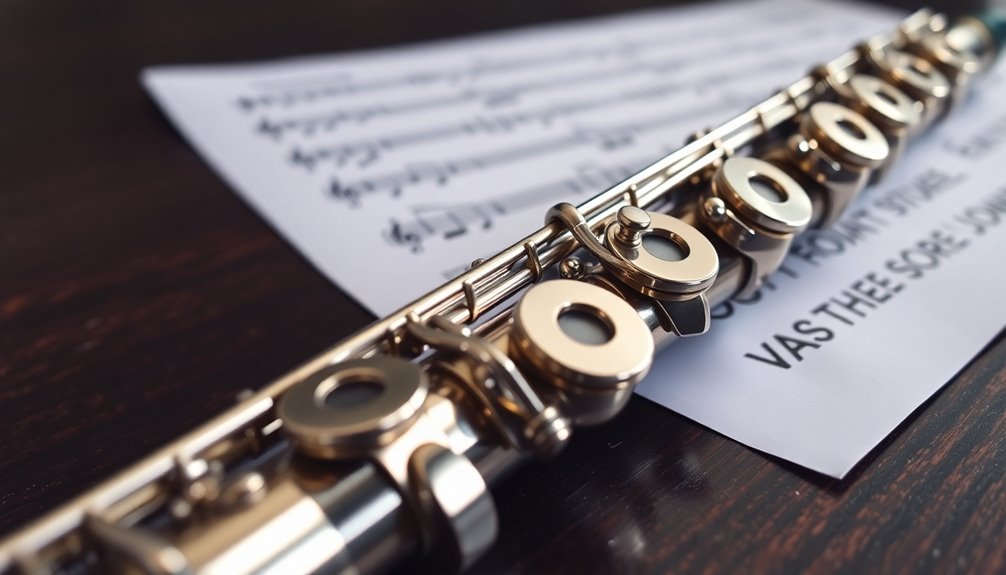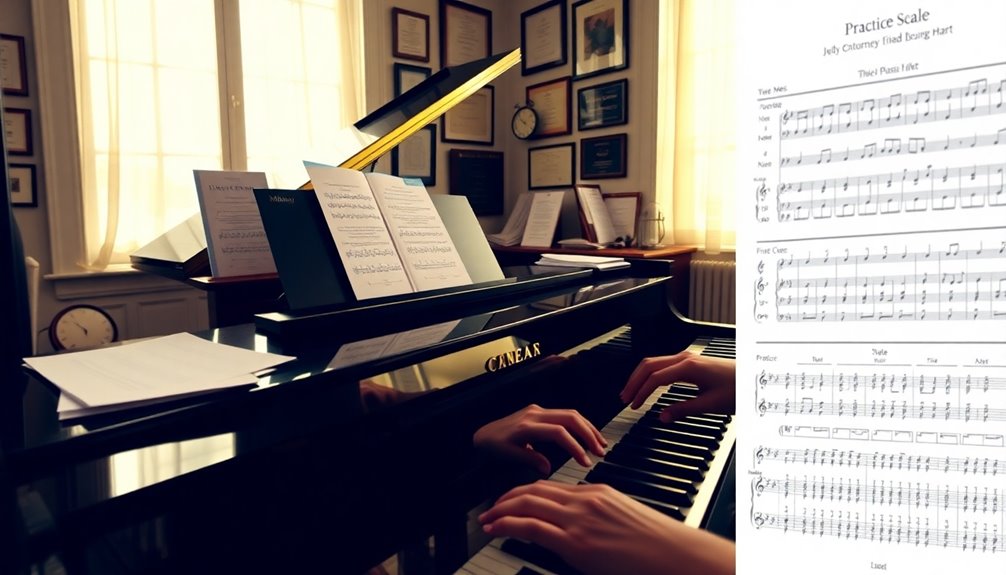To achieve proficiency through scale practice, focus on the variety of scales like major, minor, and chromatic. These enhance your finger dexterity, coordination, and muscle memory. Incorporate varied rhythms and dynamics to develop expressive playing and emotional depth. Set clear, attainable goals to maintain focus, and create a structured practice routine that includes warm-ups and technical exercises. Document your progress in a practice journal to identify growth areas and challenges. Engage with a community for support and motivation. By integrating these strategies, you'll enhance your musicianship markedly. There's much more to explore about optimizing your practice.
Key Takeaways
- Regular scale practice enhances finger dexterity, coordination, and muscle memory, essential for mastering complex musical pieces.
- Incorporating varied rhythms and dynamics during scale practice improves overall musicianship and expressive playing.
- Establish a structured practice routine with clear goals to maintain focus, motivation, and consistent progress.
- Utilize different types of scales, including major, minor, and jazz scales, to develop versatility and improvisational skills.
- Documenting progress in a practice journal helps track improvements and reinforces accountability in your musical journey.
Importance of Scale Practice

Scale practice is a fundamental component of musical proficiency that shouldn't be overlooked. Engaging in regular scale practice offers numerous scale benefits that directly contribute to your overall skill enhancement as a musician. When you incorporate scales into your routine, you're not just repeating notes; you're building a solid foundation for your musical abilities.
Firstly, scales improve your finger dexterity and coordination, critical skills for any instrumentalist. As you practice scales, you develop muscle memory, allowing you to play more complex pieces with ease. This increased agility enables you to respond quickly to the demands of various musical styles, making you a more adaptable player.
Additionally, scale practice helps you internalize tonal relationships and improves your ear. By repeatedly playing scales, you begin to recognize intervals and develop an understanding of key signatures. This knowledge is essential for improvisation and composition, enhancing your overall musicianship. You'll find that as you become more comfortable with scales, your ability to create melodies and harmonies will flourish.
Finally, practicing scales fosters discipline and consistency, two attributes that are crucial for any musician's growth. Setting aside time for scale practice not only strengthens your technical skills but also reinforces your commitment to your craft. Furthermore, practicing scales can increase finger coordination significantly, allowing for more precise playing.
In the end, embracing scale practice cultivates a deeper sense of belonging within the musical community, as you share a common language with fellow musicians. So, immerse yourself in your scales, and watch your proficiency soar.
Types of Scales for Flute

Understanding the different types of scales you can practice on the flute is vital for enhancing your musical expression and technical prowess. Each scale offers unique benefits, contributing to your overall development as a flutist.
The major scale is fundamental, serving as the backbone of Western music. Mastering it helps you grasp key signatures and harmonic structures. In contrast, the minor scale introduces a different emotional palette, enhancing your expressive capabilities. Both scales are essential for any flutist aiming for versatility.
Exploring the chromatic scale is equally important. It allows you to navigate through half steps, refining your finger dexterity and ear training. Additionally, the whole tone scale provides a dreamy, ethereal quality, perfect for expanding your tonal vocabulary.
The pentatonic scale simplifies melodies and is common in various musical traditions, making it valuable for improvisation. The blues scale introduces expressive bends and microtonal nuances, vital for jazz and blues genres.
Speaking of jazz, incorporating jazz scales into your practice will deepen your improvisational skills and enrich your musicality. Finally, if you're interested in ensemble playing, orchestral scales are essential for blending with other instruments and understanding orchestral textures. Practicing these scales regularly can also enhance your finger technique and overall fluency on the flute.
Developing a Practice Routine

A structured practice routine is vital for any flutist aiming to achieve proficiency and musicality. To maximize your effectiveness, focus on practice consistency and goal setting. Consistency in your practice sessions helps build muscle memory and reinforces learned skills. Aim for daily practice, even if it's just for a short period. Regular engagement with your instrument fosters a deeper connection and accelerates your progress.
Start by setting clear, attainable goals for each session. For instance, you might choose to focus on a specific scale or technique. Break down larger objectives into smaller, manageable tasks. This way, you can track your progress and celebrate small victories, which is important for maintaining motivation.
Design your routine around these goals. Allocate time for warm-ups, technical exercises, and repertoire. A balanced approach guarantees you're developing all aspects of your playing. For example, begin with 10 minutes of scales to warm up your fingers, followed by 15 minutes dedicated to specific techniques or pieces you're working on.
Additionally, consider varying your practice environment and methods to keep things engaging. Changing your location or trying new exercises can bring fresh energy to your routine. Incorporating interactive video lessons can also enhance your learning experience by catering to different styles and allowing for self-paced practice.
Finally, reflect on your practice sessions regularly. Assess what worked and what didn't, adjusting your goals as needed. This reflection process not only helps you stay accountable but fosters a sense of belonging within the flutist community, as you share experiences and learn from others on a similar journey.
Techniques for Effective Practice

Effective practice techniques can greatly enhance your progress as a flutist. To truly benefit from your practice sessions, focus on incorporating scale variations and mastering fingering techniques. These elements not only improve your dexterity but also deepen your understanding of the instrument.
Here's a simple table to visualize effective practice techniques:
| Technique | Description | Benefit |
|---|---|---|
| Scale Variations | Practice scales in different patterns and sequences. | Develops versatility |
| Fingering Techniques | Focus on specific fingerings for challenging passages. | Increases accuracy |
| Slow Practice | Play through pieces or scales at a reduced tempo. | Improves muscle memory |
| Regular Reflection | After practice, assess what worked and what didn't. | Enhances future sessions |
By regularly incorporating these techniques, you'll notice an improvement in both your technical skills and overall musicianship. Scale variations, for example, can help you explore different tonalities and expand your repertoire. Meanwhile, refining your fingering techniques allows you to tackle more complex passages with confidence. Additionally, focusing on muscle memory during slow practice will enable you to execute intricate passages with greater ease.
Incorporating slow practice is essential too. It helps you develop muscle memory and allows you to focus on precision. Finally, taking time to reflect on your practice sessions fosters a growth mindset, ensuring that you're always moving forward. Embrace these techniques, and you'll feel a stronger sense of belonging within the fluting community as you achieve your goals.
Incorporating Rhythm and Dynamics

Incorporating rhythm and dynamics into your practice can elevate your playing to new heights. It's not just about hitting the right notes; it's about how you express each note through rhythmic patterns and dynamic contrast. When you integrate these elements, you create a more engaging musical experience, both for yourself and your audience.
Start by focusing on rhythmic patterns. Experiment with different time signatures and syncopations to keep your practice interesting. For instance, try playing scales using a variety of rhythms, like eighth notes followed by triplets, to develop your timing and agility. This approach not only solidifies your technical skills but also helps you internalize the feel of each pattern.
Research shows that musicians who regularly incorporate varied rhythms into their practice tend to experience improved overall musicianship.
Next, pay attention to dynamic contrast. Practice your scales at different volumes, from pianissimo to fortissimo, to explore the emotional impact of dynamics. This exercise encourages you to listen critically and adjust your playing accordingly.
For instance, when playing a scale softly, endeavor to maintain clarity; when playing loudly, focus on control. Incorporating these dynamic shifts can bring your music to life, making it more expressive. Additionally, dynamic control fosters nuanced and expressive playing styles, allowing you to convey a wider range of emotions in your performance.
Tracking Progress and Growth

As you explore rhythm and dynamics in your practice, it's equally important to track your progress and growth. Establishing clear progress metrics is essential for understanding how far you've come and identifying areas that need improvement. This isn't just about logging hours spent practicing; it's about setting specific, measurable goals that align with your musical aspirations.
Consider using a practice journal to document your daily achievements, noting what techniques you've mastered and what challenges remain.
By adopting a growth mindset, you'll foster resilience and adaptability in your practice. This means viewing setbacks as opportunities for learning rather than obstacles. For instance, if you struggle with a particular scale, break it down into smaller sections and track your improvement over time. Celebrate those small victories—every step forward is a sign of growth.
Regularly revisiting your progress metrics helps reinforce your commitment and motivation. You might find it beneficial to record yourself playing your scales to observe changes in your technique and musicality. Listening back can offer insights that may not be apparent in the moment. Additionally, incorporating a metronome practice routine can significantly enhance your timing and rhythm accuracy.
Engaging with a community, whether online or in-person, can also enhance your sense of belonging while tracking progress. Sharing your goals and achievements with others not only provides accountability but also fosters a supportive environment where you can learn from one another.
Common Challenges and Solutions

One common challenge musicians face during scale practice is the tendency to plateau in their progress. This stagnation can stem from various scale difficulties, including lack of variation in practice routines or insufficient focus on technique. If you find yourself in this situation, it's essential to adopt new practice strategies to reignite your growth.
Here's a table outlining some common challenges and their respective solutions:
| Challenge | Solution |
|---|---|
| Plateau in progress | Introduce new scales or modes |
| Lack of technique improvement | Focus on specific technical skills |
| Boredom with practice | Change practice environment |
| Inconsistent practice habits | Set a structured schedule |
By diversifying the scales you practice, you're not just going through the motions; you're pushing your boundaries. For instance, if you typically play major scales, try incorporating harmonic or melodic minor scales. Additionally, focusing on specific technical skills, such as finger strength or speed, can help break down barriers.
If boredom creeps in, consider changing your practice location. A new environment can revitalize your routine and enhance your focus. Finally, establishing a consistent practice schedule is key. Setting aside dedicated time for scale practice helps create a habit that fosters improvement. Emphasizing varied learning methods in your practice can also contribute to renewed engagement.
Embrace these strategies, and you'll find that overcoming common challenges becomes not just possible but also a rewarding part of your musical journey.
Resources for Further Learning

When you're looking to deepen your understanding of scale practice, a wealth of resources awaits beyond your immediate experience. Online courses can serve as a structured way to enhance your skills. Platforms like Coursera and Udemy offer courses specifically designed for musicians at all levels. These courses often include video tutorials, assignments, and interactive feedback, which can help you grasp complex concepts and techniques related to scale practice.
In addition to online courses, consider utilizing practice apps that cater to scale training. Apps like Yousician and Simply Piano provide guided practice sessions, helping you integrate scales into your daily routine. They often feature interactive tools that track your progress, offering real-time feedback on your performance. By using these apps, you can make your practice sessions more engaging and efficient.
Furthermore, joining online communities can amplify your learning experience. Forums and social media groups provide a supportive environment where you can ask questions, share insights, and connect with fellow musicians who share your passion for mastering scales. Engaging with a community can enhance your motivation and create a sense of belonging, which is essential for long-term growth. Additionally, investing in essential flute practice tools can significantly improve your practice sessions and help you achieve a higher level of proficiency.
Frequently Asked Questions
How Long Should I Practice Scales Each Day?
When considering how long you should practice scales each day, aim for consistency over duration.
Generally, 20 to 30 minutes of daily practice is effective for building muscle memory and improving technique. Focus on quality over quantity; make sure you're playing slowly and accurately.
Gradually increase the duration as you progress. Remember, integrating scales into your routine fosters a sense of belonging within the music community as you develop your skills alongside others.
Can I Practice Scales on Different Instruments?
Absolutely, you can practice scales on different instruments!
Instrument versatility enhances your musicianship, letting you explore scale adaptations that suit each instrument's unique qualities.
While some might argue that it's better to focus on one, diversifying your practice can deepen your understanding of music theory and improve your overall skills.
Engaging with various instruments fosters a sense of belonging in the musical community, allowing you to connect with different styles and techniques effectively.
What Is the Best Time to Practice Scales?
The best time to practice scales often depends on your personal routine and energy levels.
Morning practice can be beneficial as your mind is fresh, and you're likely to focus better.
Evening practice, on the other hand, allows you to wind down and reflect on your day's progress.
Experiment with both times to see what feels right for you; consistency is key in developing your skills and fostering a sense of belonging in your musical journey.
How Do Scales Improve My Overall Musicality?
Scales improve your overall musicality by enhancing both your technical proficiency and musical expression. As you practice scales, you develop finger agility and coordination, allowing you to tackle more complex pieces.
This technical foundation supports your ability to express emotions through music. Additionally, scales familiarize you with different keys and harmonies, enriching your understanding of musical structures.
Ultimately, mastering scales connects you more deeply to the music you love, fostering a sense of belonging in your musical journey.
Are There Specific Scales for Different Music Genres?
Did you know that over 70% of musicians adapt their scales to fit specific genres?
When you explore music, you'll find that jazz scales, like the bebop scale, enhance improvisation, while classical scales focus on harmonic structure.
Rock scales often utilize the pentatonic scale for catchy riffs. For blues, the blues scale adds that soulful touch.
Each genre has its unique scales, allowing you to express yourself in diverse musical styles.
Conclusion
So, you've mastered the scales—congratulations, you're now a scale wizard! Who knew that playing the same notes over and over could reveal the secrets of the universe? Just remember, while you're busy ascending and descending, the real magic happens in your routine and rhythm. Embrace the monotony; it's practically a rite of passage. And when those pesky challenges arise, just think of them as delightful hurdles on your journey to flute superstardom. Happy practicing!






